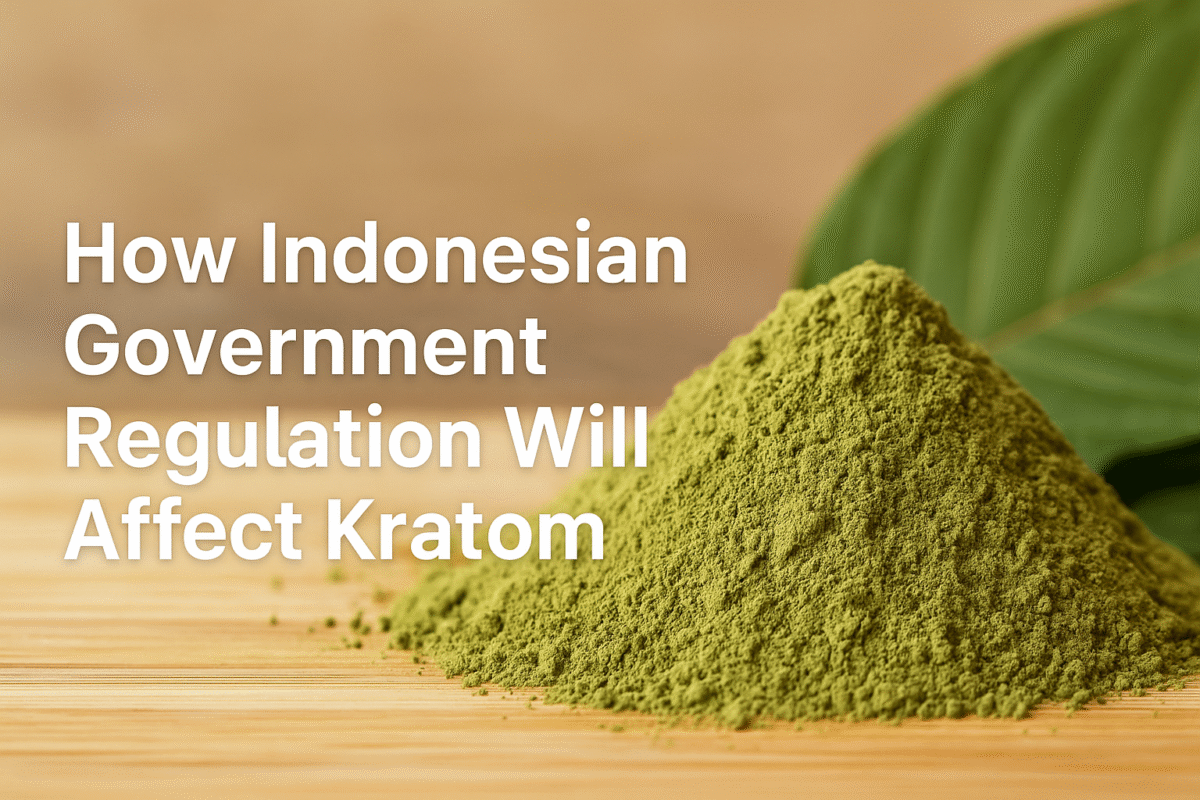Indonesia’s 2024 kratom export regulations cause delays, added costs, quotas, and require lab-tested powder only.

Background: New Regulations and Shipment Delays
In September 2024, the Indonesian government introduced new export rules for kratom through Permendag No. 20/2024 and Permendag No. 21/2024. These regulations required exporters to register, obtain a permit for each shipment, and pass lab testing.
The rollout caused significant delays—some exporters waited almost three months before shipments could resume. In fact, the first compliant shipments under this new system only moved around February 2025. Since then, exports have resumed, but the process now includes extra costs, longer timelines, and stricter requirements.
Key Changes in the Export Process due to Regulations
1. Mandatory Permit and Lab Testing
Exporters must now obtain a per-shipment export permit and undergo mandatory inspections. Testing is conducted by PT SUCOFINDO, a government-appointed lab, which screens for contaminants, heavy metals, and non-kratom material. Only once approval is granted can products be exported.
2. Powdered Form Only
The new regulation bans the export of crushed leaves. Only kratom powder up to mesh 30 is allowed, the idea is to ensure the product can’t be used for proper extract making.
3. Added Costs
Exporters face new fees for permits and testing. The cost applies per shipment, whether 1 kg or 1,000 kg, which makes small shipments disproportionately expensive. Larger orders—especially 1 ton and above—enjoy lower cost per kilo, but still face added charges.
4. Longer Waiting Times
The mandatory permit and lab testing add up to three months of extra delay for exporters. Standard shipping times remain 45–75 days by sea or 10–18 days by air (so the up to 3 months waiting time will be added to this), but the new procedures extend the overall supply chain significantly. Based on experience though, Nusabotanicals are able to ship with an extended time far less than 3 months but yes, we also experience some delay due to the regulation).
5. Export Quotas
A further update in July 2025 capped kratom exports at 25% of Indonesia’s production. This quota system means supply planning is now more critical than ever for importers and distributors.
What This Means for Buyers
For retailers and wholesalers under 1,000 kg, it’s more practical to source from ready stock in the US or EU. This avoids delays, reduces risk, and eliminates excessive permit costs.
At Nusabotanicals, we maintain ready stock in both the US and EU warehouses, enabling fast and compliant delivery for retail and mid-sized wholesale orders.
For bulk buyers (1 ton and above, we supply up to containers scale up to 15 tons or 27 tons per 20ft or 40ft container respectively), Nusabotanicals provides end-to-end export services directly from Indonesia. We have extensive experience in sourcing, regulatory compliance, and customs clearance. Buyers should allow sufficient lead time for permits, lab testing, and shipping—placing orders well before inventory runs low.
Reliable Supply Amid Regulations Uncertainty
Periods of regulatory change often create turbulence—affecting quality, speed, accountability, and transparency. While these challenges are real, Nusabotanicals has consistently prioritized open communication, problem-solving, and reliable delivery.
Whether sourcing from ready stock in the US/EU or managing bulk shipments directly from Indonesia, our commitment remains: dependable supply, consistent quality, and strong buyer support.
👉 Plan your kratom sourcing early to avoid disruptions. Contact Nusabotanicals today for ready stock or large-scale exports.

